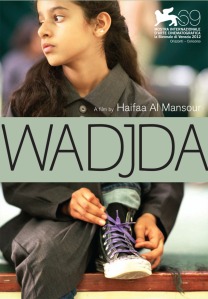- I entered the theater in hyper-critical mode, determined to parse out every flaw in Writer/Director Haifaa Al-Mansour’s film. Just because something is historic, I reasoned, doesn’t mean it is good. The response Wadjda is generating must have as much to do with the fact that it is literally history on film as with the movie’s narrative, I assumed.
- While I entered the theater a skeptic, I exited a believer, one so ardent that I now have a new favorite film from 2013. More than that, I might have a new addition to my always unformed list of Greatest Motion Pictures – All Time.
- Just as Ginger and Rosa is coming of age done right, Wadjda is a model example of how to craft a message film. It isn’t didactic. It doesn’t villainize, herofy or overdramatize, the way Traffic (2000), Crash (2004) or Disconnect do. Instead, it presents interesting characters, makes us care about and develops them through its plot, and then leaves us to form our own conclusions. That is not to say Wadjda is neutral; like any other message film, it’s not, but it is to say that Wadjda trusts its viewer and never preaches.
- More importantly, it is a spectacularly well-written narrative. Wadjda (a terrifc Waad Muhammed) and her mother (an equally good Reem Abdullah) are complex characters with depth and fascinating arcs. Lead characters in dramas like this one need to change, and both Wadjda and her mother do. While her mother’s changes are slow-burning, obvious and direct, Wadjda’s are not. I consider that the film’s greatest strength. It helps make Wadjda feel real. The youngster’s core never changes, just as most real human beings rarely alter their fundamental sense of self. No. Wadjda remains true to who she is, but also learns how to better work within the system so as to increase the odds she accomplishes her desires.
- Supporting characters are equally well-drawn. Wadjda’s father (Sultan Al-Assaf) is not a villain and only barely qualifies as an antagonist. Al-Mansour resists the urge to make the man unlikable. He is tender with his daughter and seems to truly care about Wadjda, just as he values the wife whose feelings he routinely hurts. His biggest flaw, really, is that he’s a member of the society in which he lives, and he doesn’t see reason to challenge it. Miss Hussa (AHD) is similarly well-written. Al-Mansour gives the head-mistress at least two occasions of open humanity in front of her students as well as an off-screen scandal that plays a vital role in how Wadjda relates to her school’s leader.
- The plot is well-paced.
- Equally impressively, Al-Mansour treats Saudi culture fairly, showing the society’s conservatism, but also highlighting that it has pockets of tolerance. In that way, Wadjda is as balanced as any message movie can be.
- Somehow I have yet to mention the performances. Every actor hits every note at every turn. Waad Muhammed is a revelation – what an amazingly talented young woman. Reem Abdullah is equally terrific, as are Abdullrahman Al Gohani as Abdullah and Sultan Al-Assaf. Honestly, Wadjda doesn’t include an actor who isn’t worthy of far more praise than I’m offering.
- Yet, Wadjda is not all narrative and no art. While not revolutionary like the director of Gravity or even artistically gifted like The Grandmaster’s, Al-Mansour lights her actors skillfully and uses depth well. She also incorporates the perfect locations. These elements give us something that is, in fact, attractive on the screen. Similarly, Wadjda’s subtle score and soundtrack helps set mood and tone without ever distracting or otherwise commanding undue attention.
- I’ll end with this: Waadja is being considered for an Oscar as Saudi Arabia’s first ever submission for Best Foreign Language Film. As it is flawless, it would certainly deserve a nomination. And, indeed, a victory.
- Final Grade: A+
-
Subscribe
Subscribed
Already have a WordPress.com account? Log in now.

The Oscar for foreign language film always has some controversy to it. Certain great films are often relegated as ineligible. That hasn’t happened to Wadjda, but it is still needs to secure the nomination. I really hope this gets noticed. It certainly deserves the recognition. We shall see.
We shall indeed.
I am trying to see the other leading candidates, but thus far I can’t find them. They’re not in theaters around me and as yet remain unavailable to rent. So, as I have had to be with 12 Years a Slave and All Is Lost, I’m trying to be patient.
Very nice review here, James. You’ve got me excited to check this out. Any idea when it might hit DVD?
Just did a quick Google search. As yet, it doesn’t seem a DVD release date as been announced. So, sadly, no. It just left the Landmark theaters near me though, so it could be a few months.
Hopefully Wadjda is nominated for best Foreign Language Film and/or other Oscars. If it is, it could theoretically get a wider release then.
Yeah, it seems I missed its theatrical run here. Bummer. Thanks for the info though! Looking forward to giving this a watch.
I will check it out, been a while since I saw a good import, I shall report back….
Sounds good.
The Hunt is really good, as well.